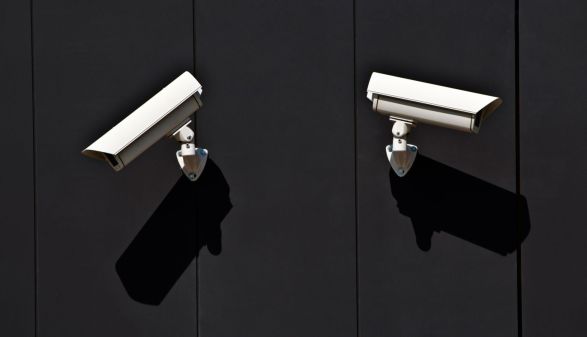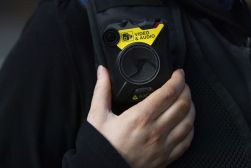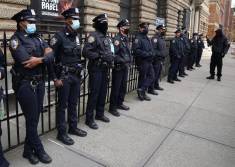Police body cameras: state courts could play central role in accountability

State courts could play a heightened role in ensuring that police officers turn on their body cameras during everyday encounters, according to a new report from civil rights advocates and criminal justice researchers.
Many police departments don’t have adequate policies in place to ensure that officers activate their body-worn cameras when they’re supposed to, according to the report — titled No Tape, No Testimony — compiled by analysts with the American Civil Liberties Union of Massachusetts and the Samuelson Law, Technology and Public Policy Clinic at the University of California, Berkeley. But state courts are well-positioned to adopt new guidelines on how to instruct juries in cases of officer-involved shootings in which video footage was not recorded.
Specifically, the researchers published in the November 29 report a template of jury instructions courts could start using that would require jurors to evaluate whether an officer had justifiable reason not to activate a body camera, or if he had acted in “bad faith.” If bad faith is determined, the guidelines would give jurors the opportunity to disregard officer testimony.
“State courts can help ensure the existence of video by empowering juries,” said Matthew Segal, legal director for the ACLU chapter and one of the report’s authors. “Courts can enable juries to become vehicles for police accountability.”
Historical Precedents
Segal and the other researchers cited in their report high-profile police killings where video evidence has ultimately disproven the accounts of officers. Namely, analysts noted that in the 2014 shooting of LaQuan McDonald in Chicago and the 2015 shooting of Walter Scott in South Carolina, recordings captured by bystanders refuted officers’ initial accounts of the incidents.
“The videos have also raised the expectation that when an encounter between an officer and a civilian results in violence, video evidence should be used to sort out what happened,” the researchers wrote. “The natural question in these circumstances becomes ‘Where’s the videotape?’”
There were several cases highlighted in the report that suggest “police officer testimony is given more weight within the legal system than testimony from civilians,” even in cases where video footage ultimately proves the officers were in the wrong.
But Seagal and company said they worry that most law enforcement agencies lack the policies to require their officers use body cameras during critical interactions.
“Many police departments do not specify any clear consequences for violations of departmental policies on using body cameras,” the report states. Further complicating things, these policies “can be amended at will, tend to vary from department to department and require consistent enforcement from police supervisors.”
Seagal lamented the lack of uniform governance over the issue.
“It’s possible that individual departments can get it right, but it’s often the case that the ones that need strong policies the most don’t have them,” he said.
Power Struggle
The courts are in a more objective position to ensure police accountability, rather than leaving it to the departments to watch themselves, Seagal said, and added that similar precedents already exist.
The researchers found that courts in eight states — Alaska, Arkansas, Indiana, Massachusetts, Minnesota, New Jersey, Utah and Wisconsin — have already begun crafting guidelines, some of which include strict jury instructions that pertain to the use of video during interrogation sessions.
Jury instructions centered around body cameras could be a natural outgrowth of this rulemaking trend. These guidelines would direct jurors to “draw inferences in favor of a civilian and against a police officer or department if, in the jury’s view, the failure of the police to record an encounter was unreasonable or the result of bad faith” and establish criteria for jurors to make such a determination.
But, those jury instructions are potentially “prejudicial” toward officers, said Richard Johnson, a former law enforcement officer who runs a police news website.
“The vast majority of jurors have no real legal experience or knowledge and frequently take their cues from the judge,” Johnson said. “The specific words the judge uses or even just the inflection in his or her voice could influence the jury deliberations.”
The instructions are “nothing more than a crutch for a lazy defense attorney,” Johnson said, and argued that a typical cross-examination could address any claim of officer misconduct.
“It is the defense attorney’s job to present the information about the lack of a video through the testimony of the witness,” Johnson said. “If there are aspects of the incident that suggest evidence tampering by the officer, it is the duty of the defense attorney to bring these to the jury’s attention and incumbent on the prosecution to present a reasonable explanation for the incident. The jury can then make a determination on its own if the officer can be believed or not in its deliberations.”
Seagal disagreed.
“It’s just not true that [we] can expect cases will be resolved correctly if it’s an officer’s word against a civilian’s,” no matter how convincing a defense attorney’s cross examination might be, Seagal said. “If you’ve been awake for the last few years, you know it’s just not true that things always work out the right way.”
Johnson went as far as to contest the report’s underlying premise that judges should play a role in the process of police accountability.
“Courts have no role to play in the internal workings of an executive agency,” he said.
But with Donald Trump soon entering the White House and with his selection of Sen. Jeff Sessions as attorney general, a new approach on this issue will be needed now more than ever, Seagal said.
“The federal government has been really involved in regulating this issue in the past, and it would probably be reasonable to predict we’ll see less of that with this new Justice Department,” Seagal said. “State courts could be hugely important here.”






